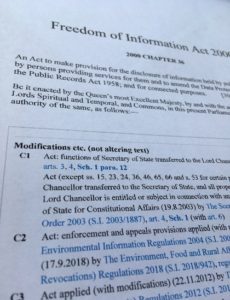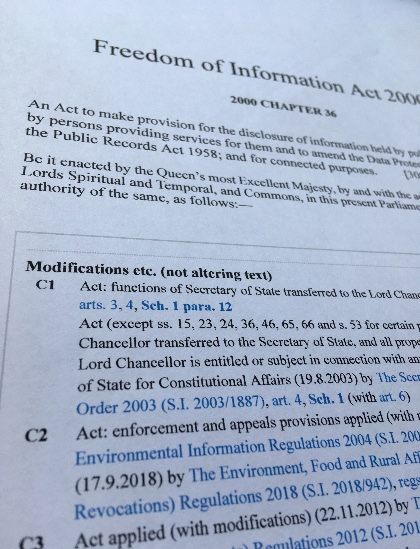Big cat investigators can gather much information on British big cats in Britain through the Freedom of Information Act, (FOIA, pronounced “foyer”,) which obliges public bodies and government agencies including local authorities to disclose information requested by citizens. Making FOIA requests is certainly easier than getting down on your hands and knees looking for big cat field signs in the wilderness and trying to scoop possible big cat poo into a bag for DNA analysis!

Image © Matt Salusbury; text, design, typography and layout Crown Copyright
Some of the bodies that hold useful data on big cats include police forces – their police logs document calls from the public reporting big cat sightings to them – local authorities – they enforce Dangerous Wild Animals Act licences needed by people who keep big cats in captivity – and nature management agencies such as the Forestry Commission, English Nature and the Norfolk and Suffolk Broads Authority.
I have been making FOIA requests about big cats in Suffolk (and East Anglia) for the past six years. Relevant disclosures under FOIA will be published here. (In some cases, even though the information is “free”, it remains Crown copyright of the body that has it, which takes time to clear.)
For now, the link below will take you to a recent FOIA disclosure on a male bobcat that escaped from captivity in West Suffolk in March 2020. This bobcat was then shot and injured, then rescued by the RSPCA and rehomed. The disclosure reveals that someone in West Suffolk was at the time keeping half a dozen big cats which were all transferred to the ownership of another individual or organisation at around that time:
- West Suffolk bobcat escaped while being transferred to a zoo, FOIA disclosure reveals.by Matt Salusbury, 28 July 2021, FOIA disclosure from West Suffolk Council’s Licensing Department on a Dangerous Wild Animal escape and follow-up.
- “Map shows every big cat sighting in Norfolk over the past six years” (2010-2016)by Jess Clara, East Anglian Daily Times, 18 October 2016, FOIA disclosure form Norfolk Police on their logs of big cat sightings.
If you are interested in collaborating with me on making more FOIA requests in this area, or on possible training sessions on FOIA requests for big cat investigators, please get in touch.
